Appliance removal, disposal, and recycling
Home ❯ Junk Disposal Guides ❯ Appliance Disposal Guide

The Most Complete Guide to Proper Appliance Disposal and Understanding All Your Options
Part of buying a new appliance is figuring out how to get rid of the old, unwanted appliance. Because it seems like the easiest option, your first thought may be to take those used appliances to the curb. Unfortunately, most city trash services won’t pick up an old appliance left at the curb. It is bad for the environment and is considered illegal dumping.
No need to worry, because you’re currently reading the essential guide to proper appliance disposal, with seven ecologically safe ways to get rid of your old appliances.
Introduction to Appliance Disposal
Disposing of old appliances can be challenging due to their weight and size, and the presence of harmful chemicals that can harm the environment. Transporting them to a local landfill or transfer station without the proper transportation can be difficult. Additionally, you will need to call around, because only a limited number of places accept old appliances, and most will charge a disposal fee.
To make an informed decision about disposing of your appliance, it is important to know all the options at your disposal. We’ve compiled some eco-friendly options for you. Start by assessing the condition of your appliance.
Assessing Appliance Condition
The condition of your appliance is the determining factor in deciding the best way to remove it from your home. You’ll want to judge how well the appliance works, the appliance’s age, any health hazards, and more.
Determining Age
Most appliances typically will last for about 10 to 20 years. Modern appliances that are made after the 1970s and 80s are stamped with serial numbers to indicate their specific date of manufacture. If your appliance is even older than that, you will probably need to do some research or hire a product specialist to figure out the appliance’s exact age.
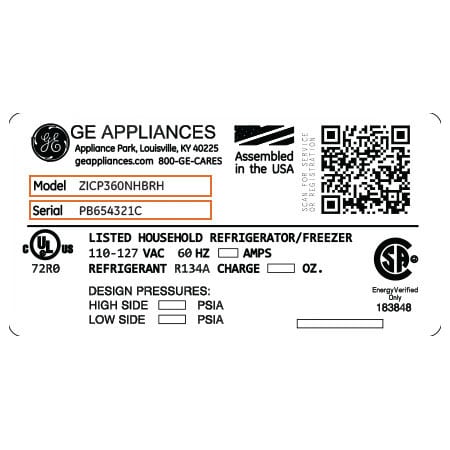
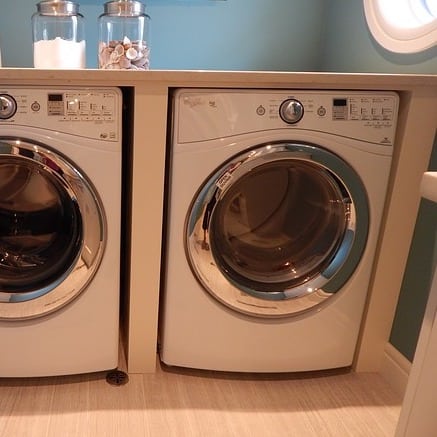
Evaluating Performance
You can determine the condition of your appliance by checking for any weird noises or irregular movement. If an old washing machine, dryer, or other appliance makes loud noises or vibrates excessively, it will need to be thoroughly inspected. You should evaluate and note any other strange abnormalities you may find; this information can be useful in diagnosing any problems and other needed repairs.
Look for Mold and Mildew
Indoor moisture is the perfect breeding ground for mold and mildew. These fungi cousins will grow in any household appliance. Thoroughly inspect your old appliances for any black spots or bad smells. It is important to get rid of mold or mildew in your home quickly, as they can cause serious health problems such as asthma, lung disease and more.
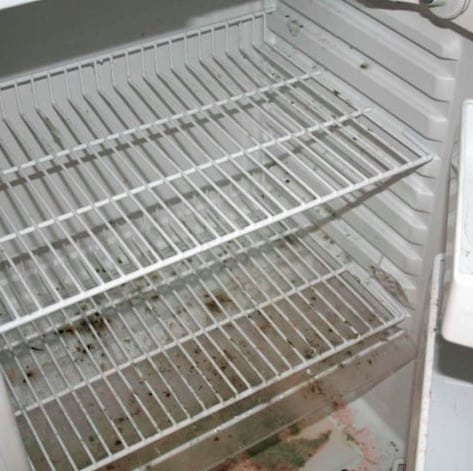
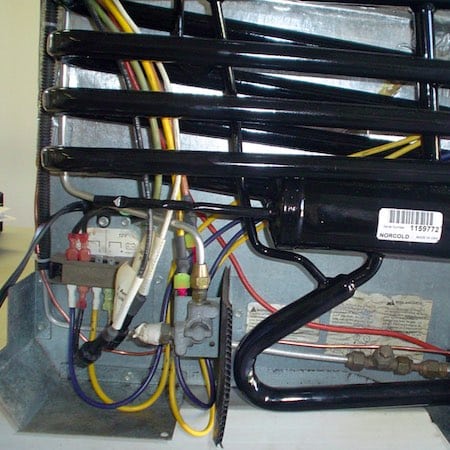
Detecting Efficiency
Have you noticed your lights flickering or an unexplained jump in your power bill? One or more of your appliances are likely to blame. Older appliances are typically way less energy-efficient and begin to malfunction as they age. The resulting power surges can cause electrical damage to your home ranging from a tripped breaker to an electrical fire.
Check for Infestation
Insects such as cockroaches love to live and lay their eggs in hidden spots near a food and water source. This makes appliances prime real estate, and infestation a common problem. Look inside and around appliances for signs of activity such as shed skins, egg cases, and droppings. Use a flashlight to thoroughly inspect all cracks and crevices.

OPTION 1: Donate to Charity
If your appliance is less than 10 years old and in good, working condition, think about donating it to a local charity. You can help protect the environment and provide assistance to people in need by donating your gently used appliances. Many local nonprofit organizations will likely accept your unwanted refrigerator, washer/dryer set, etc. Once donated, it will be used by a struggling family or resold in the charity’s thrift shop with the revenue going to finance their work and programs in the area. Relax knowing that the appliances that once helped care for your family can work to make a happy home for someone less fortunate in your community.
Nationwide Charities Accepting Appliance Donations

Habitat for Humanity
Call your nearest Habitat for Humanity ReStore to confirm their donation hours and whether they offer pickup of large items.

The Salvation Army
The Salvation Army offers pickup 2 weeks to a month after scheduling. Appliances may also be dropped off at a Salvation Army Family Store.

Goodwill Industries
Goodwill currently only accepts small household appliances, which can be dropped off at your nearest Goodwill donation center.

St. Vincent De Paul
Contact your local St. Vincent de Paul chapter to find out what appliances they can accept and where to drop off your donation.
OPTION 2: Recycle Your Appliance
About 9 million refrigerators alone are thrown away each year. Most people think broken appliances can’t be recycled and are destined for the landfill. However, this is a huge misconception. Large household appliances including stoves, air conditioners, refrigerators, washing machines, and dishwashers can be recycled! When an appliance is in poor condition or is broken, the best choice for disposal is to recycle it. Dumping an appliance illegally or in a landfill can be dangerous.
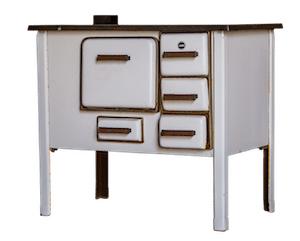
Most appliances contain hazardous elements like Mercury and coolants that contribute to greenhouse gas emissions and destruction of the ozone layer. The release of these toxic chemicals can contaminate groundwater as well, making their way into the local water supply. These toxins can cause serious illness including cancer and damage to the liver, brain, and immune system.
Tossing your used appliances in a landfill or somewhere illegal is not only harmful to the environment, but also the community, and your family.
Want to do your part to protect the environment and your community in a simple way? Just skip the dump, and recycle all your old appliances today. You’ll feel good about doing something good!
City Recycling Programs
Most cities offer local appliance recycling programs since many states have banned landfill disposal of household appliances. While most cities require drop-off of items to be recycled, some do offer curbside pickup service. You’ll need to call your local solid waste office for details on what services they offer and any regulations.
There are a few steps you need to take in order to prepare your appliances for recycling. Unplug and drain the appliance of any water several days before pickup or drop-off. Make sure the appliance is completely clean and dry. If the appliance contains any mercury or coolant, you’ll need to have it removed by a professional before recycling.
Appliance Items Not Recyclable:
- Plastic liners
- Glass shelving
- Freon and other coolants
- Mercury switches and relays
- Items that are infested with insects or mold
- Used oil from cooling circuits
- Items that have been recalled
- Ozone-depleting foam insulation
- Blowing agents from foam insulation
- Polychlorinated biphenyl (PCB) capacitors
OPTION 3: Sell Your Appliance
When your appliance is in good, working condition, you can try to sell it through an online platform or local newspaper. The condition and age of your unwanted appliance will determine how much it can be sold for. This is a great option for putting a little extra cash in your wallet, plus you’ll be helping someone replace a broken appliance when they might not be able to afford a brand new one. You could also put the extra income toward a purchasing new appliance for yourself.

Facebook Marketplace is a tool that allows Facebook users to buy and sell items with people nearby. Once you post a picture, description, and price of the appliance you are selling in Marketplace, potential buyers can find it by either browsing categories or searching for related keywords and filtering by price or location. When someone decides to buy your appliance, they can contact you to work out the details of the transaction.

Craigslist is a popular online classified listings website. Sellers post listings for items on their location page under the category it falls under. You can easily post your appliance for sale on the website for free. Use quality pictures and a specific description to quickly attract buyers. Whenever you find a buyer and meet them to complete the transaction, make sure to meet in a public place and bring someone with you if possible in order ensure safety.

Oodle takes a bit of a different approach to helping you locally sell your used appliance. When you use other local marketplace apps and pages, they only show you listings directly posted to their site. Oodle, on the other hand, shows you listings that people posted on the Oodle website, as well as listings from similar services such as Craigslist, Facebook Marketplace, Letgo, OfferUp, and eBay.
Whether you are selling or donating your old appliance, remember to be considerate. If you would be embarrassed to receive it, then you probably shouldn’t pass it on to someone else. If your appliance is broken or infested, it will need to be properly and safely destroyed. Your best option might be to schedule with an appliance disposal professional service.
OPTION 4: Give Your Appliance Away
Giving away your appliance doesn’t mean you need to donate it to a charity or other organization. You can always give it to a friend or family member you’re aware of that might need one or if they’ve been in the market for a specific appliance. It is a efficient way to hand down your used appliance without the heavy burden of recycling it properly weighing on you.

Share The Love
Pass on all your old appliances to a person who recently graduated college or a family that has bought their first home. A recent college graduate is likely living on a tight budget. Most first-time homebuyers probably spend their hard-earned money on the down payment and any closing costs of their home. At these important times in a person’s life, buying appliances is not on the top of the priority list.

Move It Downstairs
Instead of getting rid of your old appliance, is there another room in your home that could use it? An older refrigerator or freezer could be placed in the garage for any excess kitchen storage, in the kids’ playroom for quick access to juice, or in the basement for hosting parties. Not only are you still putting your old appliance to good use, you’re providing easy access for your family or guests.

Give To A Startup
Do you have a friend or family member who just opened their own business? When you first start a business, it can take anywhere from a few months to a few years until any profit is turned. Giving your refrigerator or dishwasher to a startup as a business warming gift can help make a bare-bones office potentially more productive and comfortable.

Ask Your Community
Start by asking your homeowner’s association or property manager if there’s a community forum you can post in to re-home your appliance. These organizations may have an internal message board for these types of situations. You may also want to advertise your free appliance by putting up flyers in several areas around your local neighborhood.
OPTION 5: Fix Up Your Appliance
Although your old appliance may be a hunk of junk, it may not be in your personal budget to purchase a new one. In this case, you might need to fix up your old appliance or have it properly repaired. Depending on the age of your appliance, calling a local repairman could run you 20-30% cheaper than buying something brand-new, ultimately helping you save.
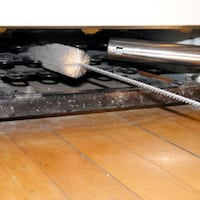
Refrigerator Maintenance: If your refrigerator is leaking or overheating, check around the coils and drain hose to make sure there isn’t any dust, ice, or debris buildup. Remove all of the buildup and it should help your refrigerator’s temperature level out. If this does not help, call a repairman. They find the root of the problem and replace any necessary parts for half the price of a new one.

Water Valve: Is your washing machine filling up slowly with water or not at all? Check the water valve. It might be clogged or restricted. Try completely clearing out the valve and then run it with a quick rinse and drain cycle. If it requires any necessary replacements, it will likely cost you less than $100. You can try to do this by yourself just by watching a few short tutorials on Youtube.
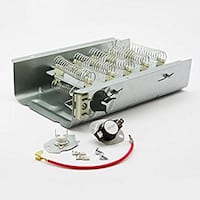
Dryer Heating Elements: A drum spinning without heating anything could be caused by a bad fuse, timer, thermostat, or temperature switch. If the dryer is getting overheated, then you most likely have a clogged vent or faulty heating coil. Fortunately, resolving these issues is typically straightforward and budget-friendly, allowing you to get your dryer back to working properly.
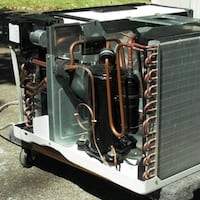
Air Conditioner Troubleshooting: Living in areas that are especially hot, like Arizona or Florida, can be incredibly frustrating if your air conditioner suddenly malfunctions. Common issues that can disrupt your cool comfort include poor airflow, dirty coils or filters, and a lack of refrigerant. To check this, thoroughly inspect your AC unit to identify if any of these factors are to blame.
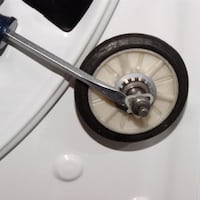
Drum Roller: If your washing machine suddenly made a loud thud, there’s no need to panic about the cost of a brand new appliance just yet. A loud noise doesn’t always indicate a major problem. In many cases, the issue can be easily explained and resolved. For example, the washer might simply need a new roller for the drum, which can be as affordable as $10-15. Consider exploring affordable solutions such as replacing the drum roller for potential cost savings.
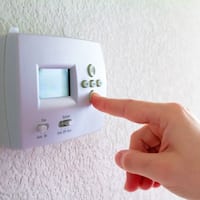
Thermostat Reset: For an HVAC unit that stopped working, try resetting the thermostat. In order to do this, you are going to need to fully turn off the thermostat. Then, locate the circuit breaker box and reset it. Give the air conditioner about a half hour to reset. Once the time has passed, turn your thermostat back to cool to check and see if the airflow returns back to the way it was.
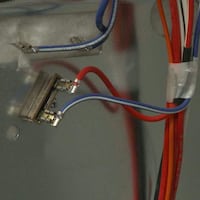
Oven Fuses: If your oven won’t start, it may be due to a blown fuse. A blown fuse can also be a sign of a wiring or component problem, so you’ll want to check the heating element and wiring before replacing the old fuse. Always prioritize safety and remember to disconnect the appliance from the main power source by fully unplugging it or switching off the circuit breaker beforehand.
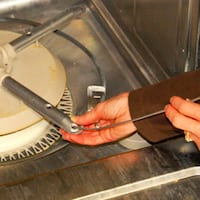
Spray Arms: Have you noticed that your dishes are coming out of the dishwasher still dirty? The spray arms could likely be to blame. Check to make sure they are not clogged with debris, loose, cracked, or worn down. If you notice that your filters are clogged, it is crucial to not only clean or replace them but also inspect the entire filtration system for any potential problems or blockages.
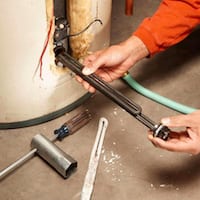
Water Heating Element: An electric water heater that has started making some strange popping noises could be an indication of mineral deposits on the heating element, especially if you have hard water. Simply remove the heater element and clean or replace it, then carefully inspect the area for any potential leaks, ensuring the proper functionality and safety of your water heater.
OPTION 6: Repurpose Your Appliance
Instead of dealing with selling your used appliances or taking them to be recycled or donated, you can also use the materials they are made of in other ways around your home. Even if your old refrigerator or washing machine is broken beyond repair, you can still get plenty of use out of its parts. Common appliance materials such as the steel cabinets, glass and wire shelving, heating elements, metal coils, wires and cables as well as some plastic parts can be reused.
Steel Appliance Cases
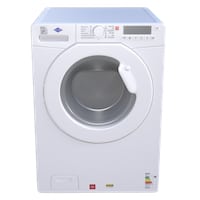
The steel outer casing of large appliances can be recycled and reused in the production of newer appliances and numerous other items. Aside from being used for scrap metal purposes, some steel appliance cabinets can be repurposed as useful home goods.
Recycled Steel: Every year, about 70 million tons of steel scrap from discarded products like appliances, cans, cars, and construction materials are made into items such as newer appliances, aircraft, plumbing, and ductwork. Repurposing metal from old appliances in this way helps to reduce waste and pollution in your local environment by about 80%.
Get Creative with Steel: You can get a little crafty and transform the steel casing of your old appliance into something new and exciting. An old refrigerator can be turned on its side and repurposed as a luxury doghouse or DIY bar cooler for parties. Try turning your old stove into a garden table, or that unwanted dryer into an aquarium or terrarium for your pets.
Heating Elements
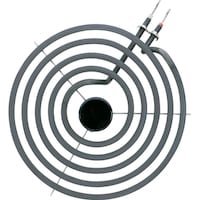
Most appliance heating elements are made of a heating alloy wire inside of a stainless steel alloy tube. Heating elements in appliances can often take the form of a straight rod (toaster oven) or a spiral/S-shape (oven/stove) for balanced and even heat distribution.
Recycled Heating Elements: Most heating elements used in household appliances are made of an alloy called nichrome. Nichrome can definitely be recycled as scrap metal and used in new products including jewelry, artwork, fireworks, 3D printers, and new mufflers.
Get Creative with Heating Elements: Since heating elements come in all shapes and sizes, they can be used for a variety of craft projects. Turn those old stove coils into aesthetic pieces such as wind chimes, wall art, or metal sculpture.
Condenser Coils
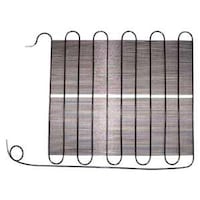
Cooling appliances such as refrigerators, freezers, and drink coolers keep items cold through the use of a refrigerant running through a series of coils. You’ll typically see condenser coils are often made of materials such as aluminum, copper, or an alloy.
Recycled Condenser Coils: The recycled copper from old condenser coils is extremely valuable, having at least 95% the value of copper from newly mined ore. Metals recycled from condenser coils can be found in anything from door hinges to medical equipment.
Get Creative with Condenser Coils: Condenser coils from an old, unwanted fridge can be upcycled into Pinterest-worthy wall racks, display boards, or lighting fixtures. Along with an appliance, all you need is tools and imagination.
Shelves & Racks
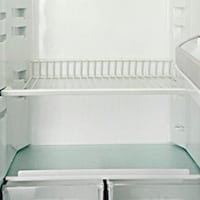
Racks and shelving from appliances such as refrigerators and dishwashers, while made of materials which we usually think of as being recyclable, can be hard to recycle due to their composition. Without a marketplace, these shelving products often end up in the landfill.
Recycled Shelves & Racks: Tempered glass from refrigerator shelves can be crushed and used as a concrete additive. Any racks or shelves made from metal are likely able to be recycled as scrap, while any plastic materials may be able to be sold to manufacturers.
Get Creative with Shelves & Racks: If you’re worried about them ending up in the landfill, there are many DIY products you can make out of the shelving and racks from your old appliances. Towel racks, floating bookshelves, closet organizers, plant stands, workshop storage and wall-mounted shelves are a couple examples of items you can create by repurposing.
**Disassembling an appliance can be dangerous due to sharp objects. Be careful and proceed with caution.
OPTION 7: Hire A Disposal Pro
You’ve probably already guessed that getting rid of your unwanted old, used appliance can be a big hassle and a lot of work. Though tempting, you don’t want to dump your appliance in an empty parking lot, on the curb, or behind a local business.
Save time, effort, and the environment. Hire an Appliance Removal Pro for eco-friendly appliance disposal.
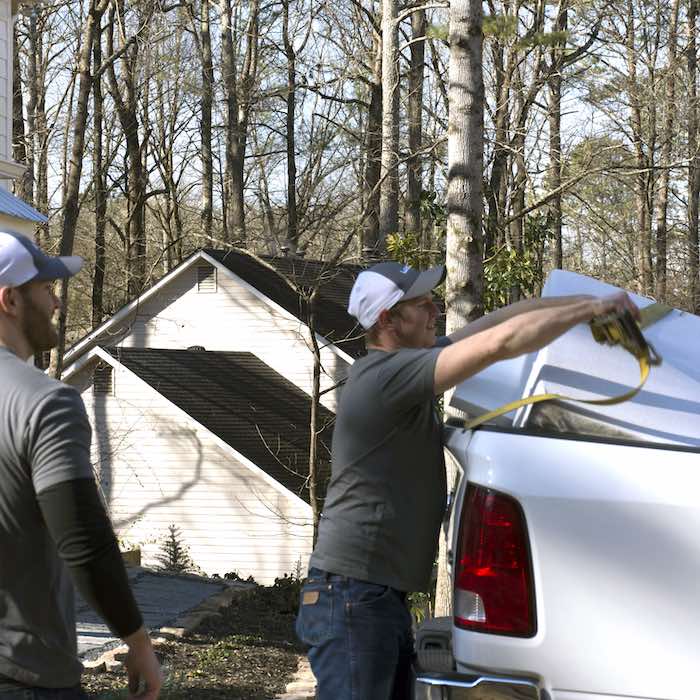
LoadUp Junk Removal
LoadUp is a nationwide appliance disposal and junk removal service with honest, guaranteed upfront pricing and flexible online booking. With dedicated disposal services seven days a week and recycling in over 160+ US cities, it’s easier than ever to book a pickup that fits your schedule. Just call or book online the day before to receive same-day service.
- 250 + Local Driver Teams
- 160 + Nationwide Cities Covered
- 43,500 + Junk Items Removed
- 29,000 + Happy Customers Served
- 2.5 Million + Pounds Diverted From Landfills
Reasons to Hire Our Professionals
Our friendly pickup professionals are fully insured and background-checked before entering your home. They’ll do all the heavy lifting, from pickup to hauling and delivery to a recycling center or charity. Most junk removal companies inflate their prices or won’t take just one appliance, but we will! View Pricing ❯
Not only will we take your single appliance, but we can also haul away furniture or mattresses for you. Maybe the environment doesn’t want your old appliance, but we do! What We Take ❯
Book Appliance Disposal Online
To book your appliance disposal pickup, give us a call at (844) 239-7711 or Book Online and let our local professionals take care of all the heavy lifting and hauling for you today!
Appliance Disposal Customer Reviews
Find out why customers prefer LoadUp Junk Removal when they need affordable, honest, and professional appliance disposal services. Our customer support team’s goal is to make your appliance disposal experience with us as convenient as possible.
OPTION 8: Dump It Yourself “DIY”
We strongly advise against dumping your old appliance yourself. Disposing of your appliance improperly has a big impact on the environment. The eco-friendly way to dispose of old appliance is recycling. Doing so will lower emissions of ozone-depleting substances and reduces energy consumption. Metal, glass, and plastic parts can be reused or repaired.
Environmental Impact
The way an appliance is discarded can have a huge impact on the environment. Chemicals found in most appliances create hazardous pollution when not properly drained and destroyed. When you dump an old appliance in the landfill, this is just as bad as leaving it on the curb. The leakage of hazardous substances such as mercury, PCBs, CFCs, and more poses a dangerous threat to waste workers and local citizens alike, emphasizing a need for proper handling and disposal.
Whether you’re upgrading to something new or just making some room, consider these facts when disposing of your appliance:
- Over 18 million appliances are thrown out every year.
- Appliances contain dangerous substances like mercury and Freon.
- Each appliance takes up an average of 21 cubic feet of landfill space.
- Local water supplies become contaminated by chemical runoff in landfills.
Doing The Right Thing!
Local regulations for proper appliance disposal vary considerably depending on your area. Some cities may prohibit the disposal of ovens, refrigerators, dishwashers, and other appliances in landfills.
If you have questions or concerns, please feel free to contact us and our dedicated LoadUp support team will always help you with finding the right appliance disposal solution for you!
![]() Book your old furniture pickup today! Book Online
Book your old furniture pickup today! Book Online
